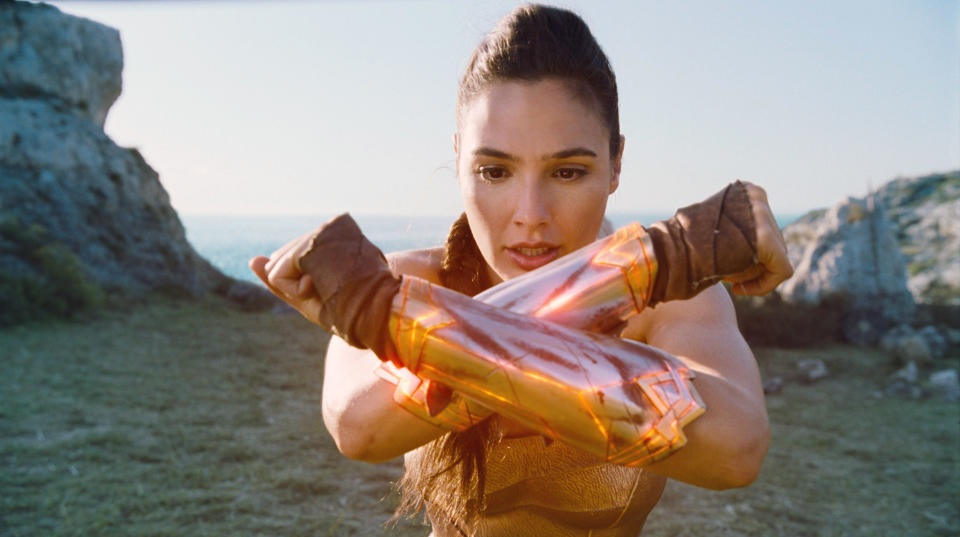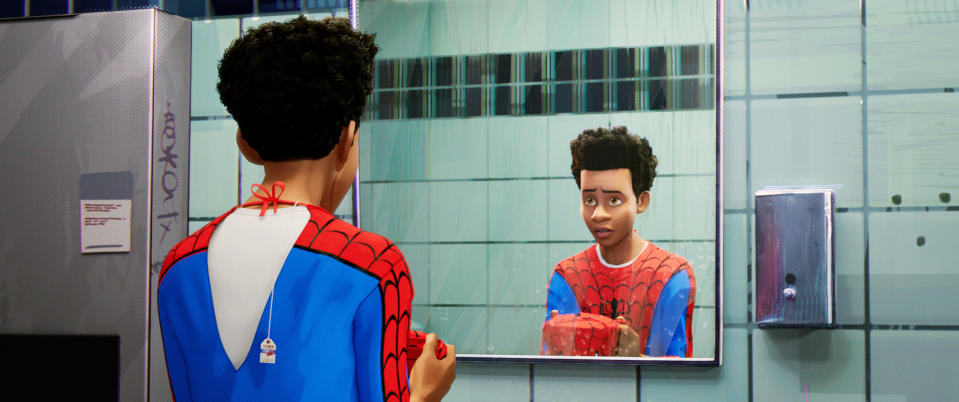How 'Black Panther' and 'Aquaman' changed the face of superhero cinema forever
In 2018, the complexion of superhero cinema finally changed … for good.
Last year began with Black Panther letting loose a mighty roar at the February box office. The first Marvel Studios movie to feature a predominantly black cast starred Chadwick Boseman and Michael B. Jordan as two cousins warring over the throne of the Afrofuturistic nation of Wakanda, as well as the heroic identity that comes with it. Directed by Ryan Coogler, Black Panther became Marvel’s highest-grossing movie domestically, topping $700 million in the U.S. alone and $1.3 billion around the world.
Fast-forward to December, and Aquaman achieved a similar feat for Marvel’s distinguished competition at DC. Anchored by biracial star Jason Momoa, the aquatic blockbuster banked more than $1.1 billion globally, putting the half-Atlantean, half-human hero ahead of such established characters as Batman and Superman. These twin success stories illustrate the kinds of superheroes that contemporary audiences are hungry for. More importantly, they represent a sea change that’s been decades in the making.

The first wave of comic book movies that swept into multiplexes in the ’80s and ’90s was directly influenced by Richard Donner’s Superman: The Movie and Tim Burton’s Batman. Released a decade apart, in 1978 and 1989, respectively, those films established the template other superheroes tried to crib from both narratively and aesthetically. And the majority of those other heroes were, not coincidentally, white and male, boasting names like The Rocketeer, The Shadow and Judge Dredd. Every few years, an enterprising studio would try to introduce a different kind of superhero — Supergirl, Tank Girl, The Meteor Man and Spawn to name a few — but the movies surrounding them weren’t creatively or financially successful enough to encourage sequels and imitators.
Then came Blade, Stephen Norrington’s 1998 hit based on the previously obscure Marvel vampire slayer. Wesley Snipes played the title role after spending much of early ’90s trying to usher Black Panther into theaters.

Having watched Spawn wither and die at the box office two years earlier, New Line Cinema was reportedly concerned about the commercial viability of another comic book movie starring a black actor. Blade screenwriter David S. Goyer revealed in a 2018 Entertainment Weekly oral history that the studio contemplated whitewashing the central character — an idea that still confounds Snipes two decades later. “I wasn’t aware that that was part of the history,” the actor told Yahoo Entertainment at the San Diego Comic Con last year. “It wouldn’t be as cool, let me tell you that!”
It almost certainly wouldn’t have been as successful either. Released in August, Blade grossed more than $100 million globally, spawning a franchise that delivered a much-needed kick to Marvel’s previously moribund cinematic ambitions. In the early ’90s, the company’s movie offerings included listless versions of The Punisher and Captain America, and a Fantastic Four movie so legendarily awful, it has still never been officially released. After Blade, characters like the X-Men, Spider-Man and Daredevil finally made the leap to the big screen and enjoyed successful theatrical runs that paved the way for the construction of the Marvel Cinematic Universe.
At the same time, this second comic book movie boom reverted to the status quo in terms of which actors were cast in the title roles. While the supporting casts of films like X-Men, Batman Begins and the first Iron Man grew more diverse, the guys in the superhero suits largely remained white guys. As in the ’90s, some movies sought to challenge that particular convention; 2004’s Catwoman starred Halle Berry as a Batman-free variation on DC’s feline burgler; 2005’s Elektra resurrected Jennifer Garner’s Daredevil ninja for a solo adventure; and 2008’s Hancock featured Will Smith — still at the height of his stardom — as a drunken version of Superman. But the decidedly mixed reaction that greeted each of those movies only convinced studios to stick with what they knew was working.
2018’s superhero revolution can be traced directly back to 2016. That’s the year that Boseman and Momoa joined their respective cinematic universes in Captain America: Civil War and Batman v. Superman: Dawn of Justice. The latter film also introduced Gal Gadot’s Wonder Woman, while Margot Robbie’s Harley Quinn became the breakout character of the surprise late summer smash Suicide Squad. Despite not being the designated stars of those movies, it was immediately clear that all four were destined for bigger showcases. Gadot was the first to flex her box-office muscle; released in the summer of 2017, the Patty Jenkins-directed Wonder Woman earned more than $400 million domestically, handily surpassing Batman v. Superman.

Eight months later, it was Boseman’s turn. Marvel had already announced a Black Panther movie in October 2014, originally pursuing director Ava DuVernay and F. Gary Gray before turning to Coogler, who was fresh off revitalizing the dormant Rocky franchise with Creed. Right way, the young director Coogler recognized the challenges, but also the possibilities, of changing the industry’s perceptions of how a black superhero would be received by a mainstream audience. “Frankly, I like movies about people of color,” Coogler told Yahoo Entertainment prior to the film’s Feb. 16, 2018 release. “I like superhero movies. I like them both, and the idea that they don’t have to be mutually exclusive is an amazing concept.”
The cast was equally aware of the movie’s transformative potential. “I think once [audiences] see what the movie is, they’re going to realize that this is a totally new experience. It is sort of a movement,” Boseman predicted. Sure enough, after a record-shattering opening weekend, “Wakanda forever,” became a rallying cry for audiences of all races and genders.
Aquaman’s path to stardom also started small: a mere cameo in Dawn of Justice followed by a supporting role in Justice League. Director Zack Snyder handpicked Momoa for the part, and primarily emphasized his larger-than-life physical presence in those two outings. But it was Aquaman director James Wan who saw the potential in marrying Momoa’s own Polynesian heritage with the character’s bispecial background. “It’s a very appropriate role for Jason,” The Conjuring mastermind told Yahoo Entertainment last December. “He brings a lot of his personality and his own upbringing into this role. The story and theme of the film [is] about a guy who feels like he doesn’t fit in to the two different worlds he’s from, but then he goes on this hero’s journey to discover that he’s actually the best of both worlds. I think that’s a really good message to be sending to kids out there.”

Wan’s take on the character resonated strongly with Momoa. “It’s an honor to be a brown-skinned superhero for sure,” Momoa said at the time. “There’s a lot of Polynesian kids who are going to be very stoked to have someone to look up to like that. I’m going to watch it with my babies, and I think it’s gonna be one of the coolest things that ever happened in my life; to hold my children’s hands and watch that movie.”
It’s important to note that the change heralded by Wonder Woman, Black Panther and Aquaman isn’t just limited to live action comic book movies. Sony’s animated hit Spider-Man: Into the Spider-Verse swaps out Peter Parker for half-black, half-Latino teenager, Miles Morales (voiced by Shameik Moore), as your friendly neighborhood Spider-Man. He’s joined by a diverse crew of Spider-People that includes Spider-Gwen (Hailee Steinfeld), Peni Parker (Kimiko Glenn) and Spider-Ham (John Mulaney). The fact that there’s already talk of sequels and spinoffs for these various characters drives home the movie’s central message: anyone can wear the mask.

Not for nothing, but T’Challa and Miles are also the two heroes who have broken awards show barriers. Spider-Verse has already won numerous statues, including a Golden Globe for Best Animated Feature, and is the frontrunner to win an Oscar in that category as well. Meanwhile, Black Panther is the first comic book movie to be nominated for Best Picture — a milestone no other hero has achieved.
So where do we go from here? 2019’s superhero line-up kicks off with Captain Marvel, the first female-led Marvel Studios production. You can also expect Black Panther’s Infinity War dusting to be undone in Avengers: Endgame, as his next solo adventure is expected to start production later this year. Meanwhile, look for DC’s new female-centric status quo to take effect in 2020. In February, Margot Robbie’s Harley Quinn will headline a Birds of Prey team-up movie alongside Mary Elizabeth Winstead and Jurnee Smollett-Bell. Finally, Gal Gadot’s Wonder Woman will return that summer for Wonder Woman 1984.
Maybe here’s the biggest sign of how 2018 changed comic book movies forever. With Ben Affleck hanging up his Bat-cowl for Matt Reeves’s The Batman, the mantle of the Dark Knight is up for grabs. One of the Internet’s favorite candidates for the next Batman? None other than Black Panther‘s Michael B. Jordan.
It’s a brave new world, and we’ve got the brave new heroes to face it.
Yahoo Entertainment’s Diversity in Hollywood 2019 Report
Part 1: Where we are, how far we have to go and how we can get there
Part 2: By the numbers
Part 3: Why it’s time for change and 5 possible solutions
Part 4: Crossroads at the Oscars
Part 5: The future is now
Read more from Yahoo Entertainment



